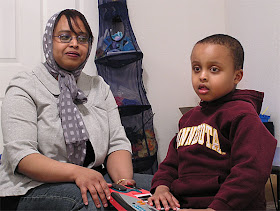ST.PAUL, Minn. — National researchers plan to investigate whether there are higher rates of autism among Somali-Americans in Minneapolis, a move that will likely be applauded by Somali parents eager for answers.
In a plan announced Jan. 18 by the advocacy group Autism Speaks, the National Institute of Health and the Centers for Disease Control and Prevention will look into concerns that the city's Somali children are disproportionately affected by autism.
"We believe it is important to verify if a true increase in prevalence exists, and if so, why it exists," said Geraldine Dawson, chief science officer for Autism Speaks, which is helping fund the investigation.
"There are two purposes of this study," she said. "One is to help the Somali population, and the second is to understand more about the different causes of autism."
If the study confirms higher rates of autism among Somali-American children, future research will need to address what factors, such as immigration or nutrition, could account for the increase, project partners say.
The investigation is scheduled to begin later this year, and will likely focus on a select population of children in Minneapolis.
Autism has been a hot topic for many Somali parents in Minnesota.
For the past few years, parent Idil Abdull of Minneapolis has asked for an investigation into the prevalence of autism in her community. Abdull, whose son was diagnosed with autism, has emerged on the front lines of the issue in Minnesota.
Abdull said she is encouraged that this research will take place.
"As a parent, if something is wrong with your child, you take him or her to the doctor with the hope they'll give you an antibiotic or tell you what's wrong," she said. "With autism, they tell you, 'This is a lifelong condition. We don't have a cause. Have a nice day.' And as a mother, I always refused to accept that."
Abdull began raising the alarm about autism in her community in 2008.
The Minnesota Department of Health released a report in 2009 confirming higher rates of Somali-American kids participating in special education classes for children with autism in Minneapolis. But it's still unclear why.
It could be that Somali parents prefer to enroll their children in school-based programs, as opposed to seeking help from autism specialists in the medical community.
"What we see among parents is such a great need to have answers, in terms of what might be causing autism," Dawson said. "Until we find those answers, I think we're going to just see a lot of speculation and a lot of theories. And that's why you need to do the good science."
Last month, Andrew Wakefield -- who has been widely discredited for his controversial research claiming a link between childhood vaccinations and autism -- visited Minneapolis to gather data and money for research into autism rates among Somali-American children.
Just weeks later, the British Medical Journal declared Wakefield an outright fraud for faking data.
A database of news and information about people with disabilities and disability issues... Copyright statement: Unless otherwise stated, all posts on this blog continue to be the property of the original author/publication/Web site, which can be found via the link at the beginning of each post.
Wednesday, January 19, 2011
National researchers plan to investigate whether there are higher rates of autism among Somali-Americans in Minneapolis
From Minnesota Public Radio. In the picture, Idil Abdull, shown in a file photo from March 2009, contacted state and federal health officials after noticing an unusually high number of Somali children in Minneapolis school autism programs. Her son Abdullahi has autism.
